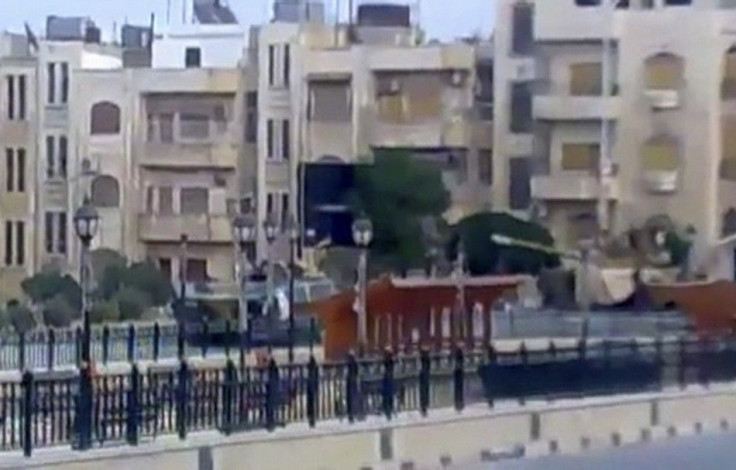Dozens die, thousands flee Syrian tank assault in Hama

Syrian troops killed at least 45 civilians in a tank assault to occupy the center of the besieged city of Hama, an activist said on Thursday, in a sharp escalation of a campaign to crush an uprising against President Bashar al-Assad's rule.
Thousands of civilians were fleeing the city, a bastion of protest surrounded by a ring of steel of troops with tanks and heavy weapons.
Electricity and communications have been cut off and as many as 130 people have been killed in a four-day military assault since Assad sent troops into the city on Sunday, activists say.
Reacting to the intensifying assaults on Hama and other Syrian districts, the U.N. Security Council condemned the use of force against civilians -- its first substantive response to nearly five months of unrest in Syria.
In Hama, residents said tanks had advanced into the main Orontes Square, the site of some of the biggest protests against Assad, who succeeded his father Hafez al-Assad in 2000. Snipers spread onto rooftops and into a nearby citadel.
An activist who managed to leave the city told Reuters that 40 people were killed by heavy machinegun fire and shelling by tanks in al-Hader district on Wednesday and early on Thursday.
The activist, who gave his name as Thaer, said five more people from the Fakhri and Assa'ad families, including two children, were killed as they were trying to leave Hama by car on the al-Dhahirya highway.
Hama has been one of the main centers of protest against Assad, reviving memories of 1982, when Assad's father sent troops to crush Islamist protests in the city, killing thousands of people and razing much of al-Hader district to the ground.
Last week tanks also moved into the eastern provincial capital of Deir al-Zor and the town of Albu Kamal on the border with Iraq's Sunni heartland. Both towns have also witnessed large pro-democracy protests.
"The security apparatus thinks it can wrap this uprising up by relying on the security option and killing as many Syrians as it thinks it will take," a diplomat in the Syrian capital said.
"Tanks are firing their guns at residential buildings in Hama and Deir al-Zor after the two cities were left for weeks to protest peacefully. This is the first time the regime is using tanks with such targeted ferocity," the diplomat said.
Syrian authorities say the army has gone into Hama to confront armed groups trying to take control of the city. They say at least eight soldiers have been killed by gunmen.
The contrasting accounts from activists and state media are difficult to verify because Syria has barred most independent media since the beginning of the protests.
Rights groups said the lack of communication with the besieged city was alarming. There were also some reports that water supplies were blocked.
"Hama has been cut off. We're in the dark and of course we're very worried," said Human Rights Watch's Beirut-based senior Syria and Lebanon researcher, Nadim Houry.
Rami Abdel Rahman of the Syrian Observatory for Human Rights said 1,500 families managed to flee Hama in the last 48 hours, heading mainly to the east or the west of the besieged city. Other activists said authorities had blocked the road north toward Aleppo and Turkey.
"We are talking about hundreds of families leaving Hama since yesterday by cars and pick-up trucks," said one activist in touch with the families which escaped.
"The Aleppo road is the most dangerous, with most 'shabbiha' (pro-Assad militia) stationed there to prevent movement up to Turkey," he said. A resident of Aleppo said police were turning families from Hama back at roadblocks.
Abdel Rahman of the Syrian Observatory said seven other people were killed across Syria during protests on Wednesday night, three of them in the southern Deraa province and two in the Damascus district of Midan.
ELECTION LAWS
Alongside the military crackdown, Assad has also lifted a state of emergency in place for nearly 50 years and promised constitutional changes to open Syria up to multi-party politics.
On Thursday he formally approved laws passed by the cabinet last week allowing the formation of political parties other than his ruling Baath Party and regulating elections to parliament, which has so far been a rubber-stamp assembly.
But most figures in Syria's fractured opposition reject any dialogue with Assad while the repression continues.
The United States, which says Assad has lost legitimacy to rule, described him on Wednesday as the cause of instability in the country. "Syria would be a better place without President Assad," White House spokesman Jay Carney said.
In New York, Indian Ambassador Hardeep Singh Puri, president this month of the Security Council, read out a statement condemning "widespread violations of human rights and the use of force against civilians by the Syrian authorities".
The U.N. document agreed after three days of hard bargaining urged Damascus to fully respect human rights and comply with its obligations under international law.
But it also urged all sides to act with restraint, reflecting divisions between the West on one hand, and China and Russia, which has a naval base in Syria. Russia said it was important that the U.N. document discouraged international involvement in Syria's affairs.
"Moscow is convinced that a solution to the situation in that country must be brought about by the Syrians themselves without any outside interference in the all-Syrian dialogue," the foreign ministry said in a statement posted on its website.
A Syrian pharmacist who managed to talk with her family in Hama told Reuters that they had tried to flee but that the "shabbiha" were randomly shooting residents.
The official Syrian news agency said "armed terrorist groups" had abducted three oil-well guards in Deir al-Zor on Wednesday, and killed one policeman.
© Copyright Thomson Reuters 2024. All rights reserved.











